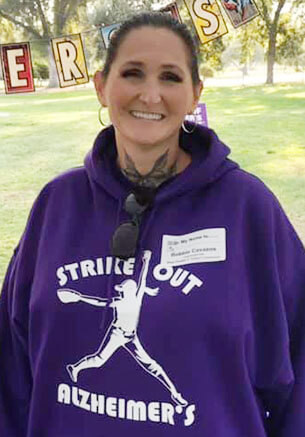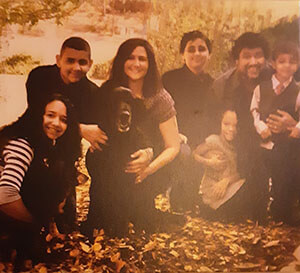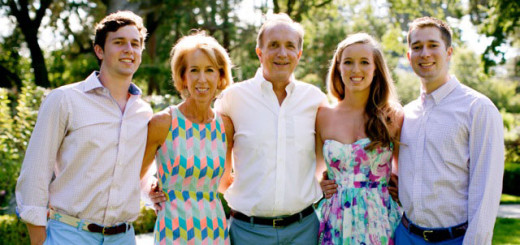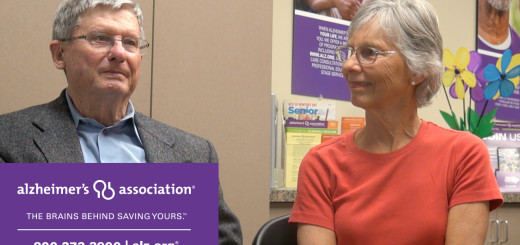Advocating for herself and others living with younger-onset Alzheimer’s
Having survived sudden cardiac arrest and other challenges in life, Bobbie Joe of Mariposa believes that she is still here for a reason. After being diagnosed with younger-onset Alzheimer’s, Bobbie Joe has focused on advocating for herself and others who are living with Alzheimer’s.
Initial signs
Bobbie Joe has always been the person in her family who took care of the finances. This was especially helpful during times when her husband, Richard Anthony, traveled for work. One time when he returned home on the weekend, he asked Bobbie Joe why there was more money in their bank account than should be there.
They discovered that Bobbie Joe had forgotten to pay the month’s bills. She also was having a hard time finding her way in their house. They reached out to her healthcare provider to try and figure out what was causing these issues.
In 2018, at the age of 42, Bobbie Joe was diagnosed with Alzheimer’s disease. The doctor encouraged Bobbie Joe to “get her affairs in order,” but did not share written materials or information on any organizations that could support her, such as the Alzheimer’s Association®.
“I was not surprised by my diagnosis, but I was devastated,” shared Bobbie Joe. “I was almost 43 years old. I was just too young to hear those words! I went home that night and cried myself to sleep.”
Bobbie Joe wishes that her doctor had taken the time to explain the disease to her and her family. It also would have helped to learn about what symptoms she may experience and how to address them.
Suggestions for professionals
Because of her age, people often tell Bobbie Joe that she is too young to have Alzheimer’s. This has made it very difficult, such as when she needed her husband to support her during a medical procedure. Due to COVID-19 rules that limited visitors, the staff did not initially think that Bobbie Joe qualified to have her husband enter the facility with her.
After showing paperwork that listed her diagnosis, she was allowed to have him join her. Bobbie Joe used this as an opportunity to educate the staff member on the rights of people living with Alzheimer’s and other dementias. She also shared a document created by other individuals living with Alzheimer’s that provides communication tips for professionals, such as not questioning someone’s diagnosis just because they may look young and/or healthy.
Bobbie Joe wishes that more community professionals had training on how to communicate with people who are living with Alzheimer’s or another dementia, especially in rural communities “Just because I may look healthy at the moment doesn’t mean I’m healthy,” she commented. “People don’t realize what’s happening to me.”
Speaking up
Having survived sudden cardiac arrest earlier in her life, Bobbie Joe feels that her purpose is to advocate and share her story, to help improve resources for those living with Alzheimer’s, especially those who are younger and/or live in rural communities. The few resources that may be available in rural communities for people living with Alzheimer’s are often designed for people who are older and/or in a later stage of the disease.
She also knows that it’s important for people in the early stage of the disease to speak up. “I can still talk and relay the message, whereas, somebody in the later stages can’t anymore,” said Bobbie Joe. “That’s why I advocate.”
Family members of Bobbie Joe’s who also had Alzheimer’s didn’t always talk about their experience. Bobbie Joe thinks that part of that was due to stigma about having Alzheimer’s.
“It’s nothing to be ashamed of and that’s what’s so frustrating,” she shared. “We have to be vocal about this in order to find a cure. That’s where change happens.”
Support of faith and family
Despite the challenges that she has experienced, Bobbie Joe shared what brings her happiness. “My story brings me happiness because I have lived a great life full of struggles, laughs, pain, and joy that have brought me to where I am today,” said Bobbie Joe. “I’m a survivor. My purpose now is to advocate.”
Bobbie Joe credits her faith and the love of her family in helping her stay positive. “I have the best caregiver anyone could ever dream of,” she told us. “He’s always going to be here for me. I appreciate that my husband listens to me and lets me be me, because he loves and respects my wishes.”
Her husband and children (Dakota, Phoenix, Cheyenne, Brooklyn and Montana) help her live every day to the fullest. During the holidays, they cooked many of their favorite dishes, including recipes passed down from her grandmother. Being together in the kitchen brought her great joy.
Encouraging others to share their story
Bobbie Joe hopes that by sharing her story, she can inspire others who are living with Alzheimer’s to advocate for training, support and research. “Everyone living with Alzheimer’s should advocate,” said Bobbie. “Real change comes when people listen to the people going through the disease. We’re still here and we still matter.”
Our website has more information for those living with Alzheimer’s or another dementia or reach us 24/7 at 800.272.3900. Learn more about how you can become an Alzheimer’s advocate at alz.org/advocate. Bobbie Joe participates in the Merced Walk to End Alzheimer’s. You can join or support her team, Strike Out Alz.
Learn more:



















